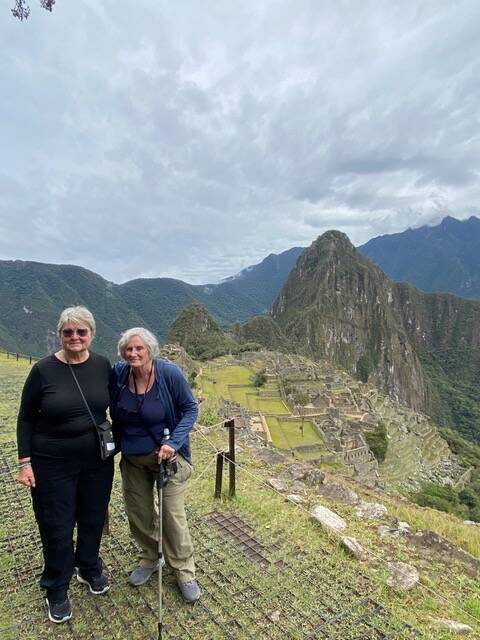An Oak Harbor resident found herself trapped near the ancient city of Machu Picchu for a week due to political protests that put Peru in a state of emergency.
Avis Berney, who is in her 70s, was finally able to take the only train out of the city of Aguas Calientes with other stranded tourists, but the track was blocked by a large boulder placed there by protestors. She was among dozens of people who had to hike the remainder of the way out at high altitude and in the dark.
The protests were in response to Peru’s former president Pedro Castillo being ousted from office. However, Berney had no idea that the country was plunging into chaos. Before arriving in Peru, she and a friend were on a boat touring the Galapagos Islands and had no access to the news.
In Peru, Berney and her friend met up with two other people who joined them in Machu Picchu. To get to the historic site set high in the Andes Mountains, visitors must take a train to Aguas Calientes, a town at the base of the mountain where there is lodging. Berney and her friends had only meant to stay in Aguas Calientes for one night.
Berney recalled their tour guide saying the bus up the mountain to Machu Picchu was the “last one to make it through” but she didn’t think too much about it and enjoyed her visit to the site.
As soon as they came back into town, the visitors discovered that they could not leave. Protesters had placed large boulders on the train tracks – the only way out of the town. One of the rocks was the size of a small car and impossible to move.
“That wasn’t really a big deal to us at that time,” Berney said.
She simply booked a massage at a parlor in Aguas Calientes to get the most out of her time there. The next day the train still could not run, but Berney had gotten sick from the altitude and felt like she couldn’t breathe deeply. Despite everything, Berney said she felt relatively calm.
She was able to stay in communication with her kids and was reassured by a large police presence in the town. The only sign she and her fellow travelers saw of the country’s political upheaval was a very small demonstration of a few protestors.
“We felt safe but what made us anxious was not knowing when we could leave,” she said, adding that the locals in Aguas Calientes treated them very well.
All of the town’s supplies come in by train. As the days went on, fewer restaurants were open and the others were running out of supplies.
“The only other way to get out of there was to walk out,” Berney said.
On the third day, tourists in the city were evaluated by medical staff and organized into three different groups. After waiting for seven hours, Berney and her friends were placed in the priority 2 group, below priority 1, which included people who had medical issues, were pregnant or had small children.
To make the situation more nerve wracking, the day before they left, their tour guide had to leave because his parents had been attacked in the city of Cusco. The person that replaced him didn’t speak any English.
Finally, on the sixth day, Berney received a text that said a train was leaving in 30 minutes. Her friends rushed back to the hotel to get their backpacks and Berney went to get in line. The tourists took the train until they reached the boulder still on the tracks. At this point, the sun was starting to go down.
Berney and the others had to walk to a police escort waiting to take them to the city of Cusco. They were told it was a two kilometer hike.
“But I’m here to tell you it was a lot longer than that,” she said, adding that a young doctor carried all of Berney’s and her friend’s backpacks – all three of them. She called him a hero.
The only reason the trapped tourists were able to leave that day was because there was a two-day truce between the Peruvian government and protestors.
Once safely in Cusco, Berney was told to immediately leave the county. She flew from Cusco to Lima, then to Houston and Los Angeles before arriving in Seattle. Back on Whidbey Island, she was greeted by 7 inches of snow.
She made it home for the holidays, albeit with a nasty cough.
Berney said the whole experience made her feel lucky to live where she does. While she does plan to travel more in the future, she’s going to take some time off.
“We certainly didn’t anticipate quite the adventure,” she said with a laugh.


